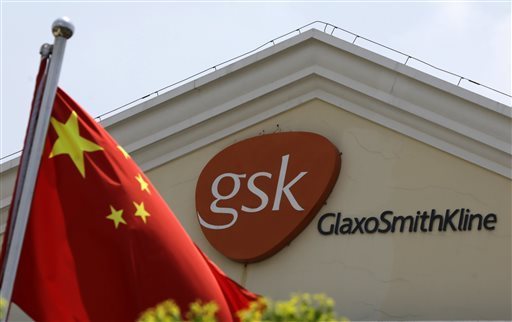 BEIJING: Chinese police has accused a British executive of drugmaker GlaxoSmithKline of leading a sprawling scheme to bribe doctors and hospitals to use its products.
BEIJING: Chinese police has accused a British executive of drugmaker GlaxoSmithKline of leading a sprawling scheme to bribe doctors and hospitals to use its products.
The announcement was the first time a foreign employee in China of British-based GSK was accused in the investigation announced last July. It highlighted the widespread use of payments to doctors and hospitals by sellers of drugs and medical equipment in a state-run and poorly funded health system that Chinese leaders have promised to improve.
The executive, Mark Reilly, is accused of operating a “massive bribery network,” said a police official, Gao Feng, at a news conference. He said the case had been handed over to prosecutors.
Beginning in January 2009, Reilly was accused of ordering his sales team to pay doctors, hospital officials and health institutions to use GSK’s products, said Gao, deputy director of the Ministry of Public Security’s economic crimes unit. He said that resulted in “illegal revenue” of billions of yuan (hundreds of millions of dollars).
Gao said that as far as he knew, Reilly still was in China, but he had no details of his status. He said dozens of other people also were implicated but he gave no names or other details.
Reilly is GSK’s senior vice president of pharmaceuticals for China and Hong Kong and former general manager for China.
Police previously identified four Chinese employees of GSK who they said confessed to bribery.
A second foreign drugmaker, AstraZeneca, said in July that police in Shanghai were investigating one of its salespeople. The company has given no information since then.
Chinese state media have publicized the investigations of GSK and AstraZeneca. But economists who study Chinese health care say such payments are more widely used by China’s domestic drug manufacturers.
Doctors and hospitals routinely accept informal payments from patients and suppliers of medical goods to top up low salaries and cover gaps in budgets.
Hospitals also raise money by adding surcharges to drug prices and assigning employees sales quotas. That can also distort treatment by encouraging overuse of expensive drugs or procedures.
As a result of bribery, GSK was able to receive prices for its medications that were up to seven times the level of the same products sold in other countries, Gao said.
In a separate statement, police in the central city of Changsha, where the investigation began, said Reilly and two Chinese executives also are accused of bribing government officials in Beijing and Shanghai.
Police in Changsha said last July that employees appeared to be trying to evade GSK’s internal anti-bribery controls by making payments totaling as much as 3 billion yuan ($490 million) to a travel agency that gave back at least part of that money.
One of the detained Chinese employees was shown on state television at that time describing how he paid bribes to government officials to win support for use of the company’s medications.
The British Embassy in Beijing said it could not comment while the case was underway and referred questions to GSK.
Gao said possible charges include bribing non-government workers and bribing corporate units, while GSK might face charges of corporate bribery.
GSK said previously it shared the Chinese government’s desire to “root out corruption” and supported the investigation.
The company has given the investigation its “full support and assistance,” said Gao. -AP






